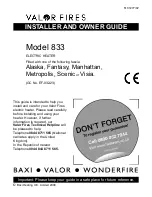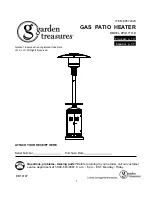
5
LP ggas aand nnatural ggas hhave m
man-m
made oodorants aadded sspecifically ffor ddetection oof ffuel ggas lleaks.
If aa ggas lleak ooccurs, yyou sshould bbe aable tto ssmell tthe ffuel ggas.
THAT’S YYOUR S
SIGNAL TTO G
GO IINTO IIMMEDIATE AACTION!
■
Do not take any action that could ignite the fuel gas. Do
not operate any electrical switches. Do not pull any
power supply or extension cords. Do not light matches
or any other source of flame. Do not use your
telephone.
■
Get everyone out of the building and away from the area
immediately.
■
Close all propane (LP) gas tank or cylinder fuel supply
valves, or the main fuel supply valve located at the
meter if you use natural gas.
■
Propane (LP) gas is heavier than air and may settle in
low areas. When you have reason to suspect a propane
leak, keep out of all low areas.
■
Natural gas is lighter than air and can collect around
rafters or ceilings.
■
Use your neighbor’s phone and call your fuel gas
supplier and your fire department. Do not re-enter the
building or area.
■
Stay out of the building and away from the area until
declared safe by the firefighters and your fuel gas
supplier.
■
FINALLY, let the fuel gas service person and the
firefighters check for escaped gas. Have them air out
the building and area before you return. Properly
trained service people must repair the leak, check for
further leakages, and then relight the appliance for you.
WARNING
■
Do not use this heater for heating human living
quarters.
■
Do not use in areas without proper air exchange. See
air exchange requirements on page 4 or on heater’s
dataplate.
■
Exhaust fans, supply air inlets, or exhaust fan outlets
must not be obstructed.
■
Proper air exchange must be provided for either indoor
or outdoor mount installations.
■
Refer to the specification section and installation
instructions of the heater’s Owner’s Manual, heater
dataplate, or contact the L.B. White Company to
determine air exchange requirements of the heater.
■
Lack of proper air exchange will lead to improper
combustion.
■
Improper combustion can lead to carbon monoxide
poisoning in humans leading to serious injury or death.
Symptoms of carbon monoxide poisoning can include
headaches, dizziness and difficulty in breathing.
Asphyxiation H
Hazard
■
Some ppeople ccannot ssmell w
well. S
Some ppeople ccannot
smell tthe oodor oof tthe m
man-m
made cchemical aadded tto
propane ((LP) oor nnatural ggas. YYou m
must ddetermine iif yyou
can ssmell tthe oodorant iin tthese ffuel ggases.
■
Learn to recognize the odor of propane (LP) gas and
natural gas. Local propane (LP) gas dealers and your
local natural gas supplier (utility) will be more than
happy to give you a scratch and sniff pamphlet. Use it
to become familiar with the fuel gas odor.
■
Smoking can decrease your ability to smell. Being
around an odor for a period of time can affect your
sensitivity to that particular odor.
■
The oodorant iin ppropane ((LP) ggas aand nnatural ggas iis
colorless aand tthe iintensity oof iits oodor ccan ffade uunder
some ccircumstances.
■
If there is an underground leak, the movement of gas
through the soil can filter the odorant.
■
Propane (LP) gas odor may differ in intensity at different
levels. Since propane (LP) gas is heavier than air, there
may be more odor at lower levels.
■
Always bbe ssensitive tto tthe sslightest ggas oodor. If you
continue to detect any gas odor, no matter how small,
treat it as a serious leak. Immediately go into action as
discussed previously.
Safety Precautions
FUEL GAS ODOR
ODOR FADING -- NO ODOR DETECTED
ATTENTION -- CRITICAL POINTS TO REMEMBER!
■
Propane (LP) gas and natural gas have a distinctive
odor. Learn to recognize these odors. (Reference Fuel
Gas Odor and Odor Fading sections above.
■
If you have not been properly trained in repair and service
of propane (LP) gas and natural gas fueled heaters, then
do not attempt to light heater, perform service or repairs,
or make any adjustments to the heater on propane (LP)
gas or natural gas fuel system.
■
Even if you are not properly trained in the service and
repair of the heater, ALWAYS be consciously aware of
the odors of propane (LP) gas and natural gas.
■
A periodic sniff test around the heater or at the heater’s
joints; i.e. hose, connections, etc., is a good safety
practice under any conditions. If you smell even a small
amount of gas, CONTACT YOUR FUEL GAS SUPPLIER
IMMEDIATELY. DO NOT WAIT!







































